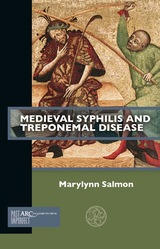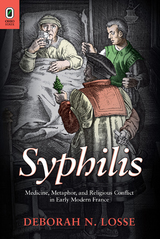6 books about Syphilis

Chicago's War on Syphilis, 1937-40
The Times, the "Trib," and the Clap Doctor
Suzanne Poirier
University of Illinois Press, 1995
"An eye for colorful vignettes and anecdotes. On target! She recognizes
the importance of her subject." -- Thomas N. Bonner, author of To
the Ends of the Earth: Women's Search for Education in Medicine
Those struggling to deal with the AIDS epidemic might learn valuable
lessons from the earlier struggle of the U.S. to deal with syphilis. Here,
Suzanne Poirier tells the story of the Chicago Syphilis Control Program
launched in 1937 by the Chicago Board of Health and the U.S. Public Health
Service and severely limited from the start because of the refusal of
government, the press, and the public to confront directly the issues
underlying the problem.
Poirier's narrative is memorable for its vivid scenes, colorful characters
that include Chicago's "clap doctor," Dr. Ben Reitman, and its
account of the heated debate that surrounded the effort. In an epilogue,
the author discusses similarities between current efforts against AIDS
and the handling and politics of the syphilis problem in the late 1930s.
the importance of her subject." -- Thomas N. Bonner, author of To
the Ends of the Earth: Women's Search for Education in Medicine
Those struggling to deal with the AIDS epidemic might learn valuable
lessons from the earlier struggle of the U.S. to deal with syphilis. Here,
Suzanne Poirier tells the story of the Chicago Syphilis Control Program
launched in 1937 by the Chicago Board of Health and the U.S. Public Health
Service and severely limited from the start because of the refusal of
government, the press, and the public to confront directly the issues
underlying the problem.
Poirier's narrative is memorable for its vivid scenes, colorful characters
that include Chicago's "clap doctor," Dr. Ben Reitman, and its
account of the heated debate that surrounded the effort. In an epilogue,
the author discusses similarities between current efforts against AIDS
and the handling and politics of the syphilis problem in the late 1930s.
[more]

Genesis and Development of a Scientific Fact
Ludwik Fleck
University of Chicago Press, 1981
Originally published in German in 1935, this monograph anticipated solutions to problems of scientific progress, the truth of scientific fact and the role of error in science now associated with the work of Thomas Kuhn and others. Arguing that every scientific concept and theory—including his own—is culturally conditioned, Fleck was appreciably ahead of his time. And as Kuhn observes in his foreword, "Though much has occurred since its publication, it remains a brilliant and largely unexploited resource."
"To many scientists just as to many historians and philosophers of science facts are things that simply are the case: they are discovered through properly passive observation of natural reality. To such views Fleck replies that facts are invented, not discovered. Moreover, the appearance of scientific facts as discovered things is itself a social construction, a made thing. A work of transparent brilliance, one of the most significant contributions toward a thoroughly sociological account of scientific knowledge."—Steven Shapin, Science
"To many scientists just as to many historians and philosophers of science facts are things that simply are the case: they are discovered through properly passive observation of natural reality. To such views Fleck replies that facts are invented, not discovered. Moreover, the appearance of scientific facts as discovered things is itself a social construction, a made thing. A work of transparent brilliance, one of the most significant contributions toward a thoroughly sociological account of scientific knowledge."—Steven Shapin, Science
[more]

Medieval Syphilis and Treponemal Disease
Marylynn Salmon
Arc Humanities Press, 2022
Leaders in the field of paleopathology have found enough evidence to prove that treponematosis, including syphilis, existed in ancient and medieval Afro-Eurasia, settling a decades-long debate. Yet documentary and artistic evidence to support this important work remains scarce. After summarizing the confirmed cases of treponematosis detected to date, this book turns to contemporary accounts about the death of the English king, Edward IV, that strongly indicate syphilis as the cause. It then considers further evidence suggesting contemporary awareness that elites tended to experience the disease more severely than commoners, and includes numerous examples from medical treatises and artworks that are highly suggestive that both endemic and venereal treponematosis (bejel and syphilis) were present in late medieval Europe. In doing so, the author hopes to spark a conversation not only about the existence of the disease in various places and times, but also its wider impact on premodern society and culture.
[more]

Persisting Pandemics
Syphilis, AIDS, and COVID
Powel H. Kazanjian
Rutgers University Press
Persisting Pandemics explores the history of syphilis and AIDS to provide insights into the limits of biomedicine and our experience with epidemics today. Novel therapies developed for syphilis and AIDS became renowned in the medical field and the broader public sphere as exemplars of biomedical innovations. Public health campaigns based on these spectacular biomedical advances, however, have repeatedly fallen short of their goals to eliminate syphilis and AIDS in the population. The diseases epitomize the power of innovative biomedical therapies for the individual while unveiling limitations of scientific medicine in the domain of public health. The need for a public health approach to address mistrust in science, government indifference, and racial inequalities is relevant for strategies to eliminate Covid-19 today. Persisting Pandemics argues that campaigns to eliminate these diseases have not succeeded because they have not adequately addressed how diseases like AIDS, syphilis, and Covid spread unevenly in populations according to race, ethnicity, and geographic location. Despite the expectation of public health officials that medical advances would render epidemics obsolete, new diseases continue to emerge and spread regardless of efforts to eliminate them. Medical doctor and historian Powel Kazanjian concludes that narratives of syphilis, AIDS and Covid, unlike smallpox, do not contain a discrete ending—at least not within the timelines specified by their elimination campaigns. Instead they will be a continued part of our existence.
[more]

Syphilis and Other Venereal Diseases
William J. Brown
Harvard University Press, 1970

Syphilis
Medicine, Metaphor, and Religious Conflict in Early Modern France
Deborah N. Losse
The Ohio State University Press, 2015
In Syphilis: Medicine, Metaphor, and Religious Conflict in Early Modern France, Deborah Losse examines how images of syphilis became central to Renaissance writing and reflected more than just the rapid spread of this new and poorly understood disease. Losse argues that early modern writers also connected syphilis with the wars of religion in sixteenth-century France. These writers, from reform-minded humanists to Protestant poets and Catholic polemicists, entered the debate from all sides by appropriating the disease as a metaphor for weakening French social institutions. Catholics and Protestants alike leveled the charge of paillardise (lechery) at one another. Losse demonstrates how they adopted the language of disease to attack each other’s politics, connecting diseased bodies with diseased doctrine.
Losse provides close readings of a range of genres, moving between polemical poetry, satirical narratives, dialogical colloquies, travel literature, and the personal essay. With chapters featuring Erasmus, Rabelais, Montaigne, Léry, and Agrippa d’Aubigné, this study compares literary descriptions of syphilis with medical descriptions. In the first full-length study of Renaissance writers’ engagement with syphilis, Deborah Losse charts a history from the most vehement rhetoric of the pox to a tenuous resolution of France’s conflicts, when both sides called for a return to order.
Losse provides close readings of a range of genres, moving between polemical poetry, satirical narratives, dialogical colloquies, travel literature, and the personal essay. With chapters featuring Erasmus, Rabelais, Montaigne, Léry, and Agrippa d’Aubigné, this study compares literary descriptions of syphilis with medical descriptions. In the first full-length study of Renaissance writers’ engagement with syphilis, Deborah Losse charts a history from the most vehement rhetoric of the pox to a tenuous resolution of France’s conflicts, when both sides called for a return to order.
[more]
READERS
Browse our collection.
PUBLISHERS
See BiblioVault's publisher services.
STUDENT SERVICES
Files for college accessibility offices.
UChicago Accessibility Resources
home | accessibility | search | about | contact us
BiblioVault ® 2001 - 2024
The University of Chicago Press









